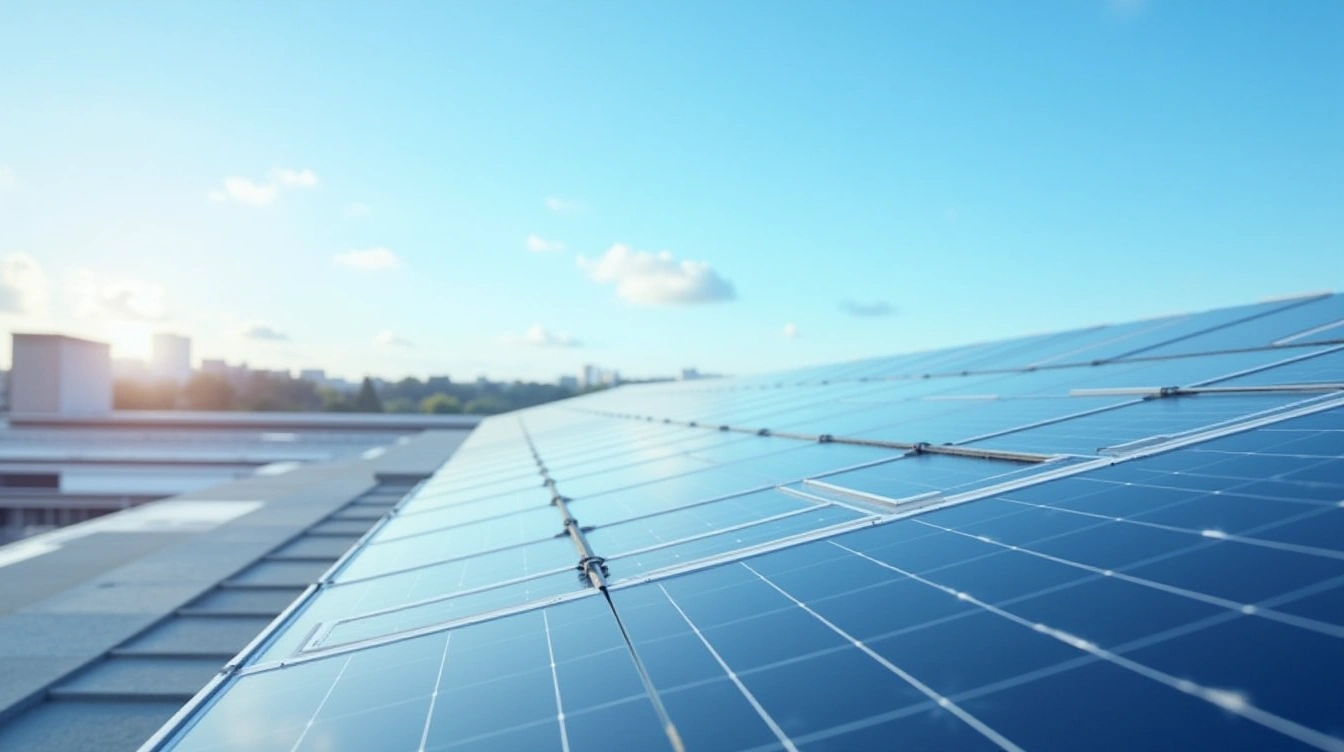Innovative commercial solar panels offer businesses a powerful way to cut energy costs while supporting sustainability goals. By choosing the right system size and installation, companies can boost efficiency and access government incentives that improve return on investment. Understanding available technologies and real-world benefits helps businesses make informed decisions that drive long-term growth and environmental responsibility.
Introduction to Commercial Solar Panels and Their Benefits
Commercial Solar systems are tailored solutions designed to meet the energy needs of businesses, offering a sustainable approach to reduce operational costs. These systems harness sunlight to generate electricity, specifically optimized for commercial premises, such as warehouses, retail stores, and office buildings.
Also to discover : Expert tree surgeons in Kent: your go-to for tree care
One of the primary advantages of Commercial Solar is its cost-effectiveness. Business owners benefit from significant energy savings, often offsetting the installation costs within a few years. For example, a typical 2 kW system can save over £4,595 annually on electricity, with payback periods generally ranging from 4 to 5 years. Such savings are pivotal, especially amid rising grid electricity prices, which can increase two to threefold, making onsite solar generation a financially wise decision.
Beyond financial gains, Commercial Solar supports corporate sustainability and environmental goals. Installing solar panels reduces carbon footprints by offsetting approximately 5 grams of CO2 per kilowatt-hour produced. This environmental benefit enhances corporate reputation, demonstrating a commitment to sustainable practices. Additionally, renewable solar energy for enterprises can align with broader corporate social responsibility strategies, appealing to environmentally conscious consumers and partners.
Topic to read : Expert cqc registration help for your healthcare business
The investment in commercial solar also provides energy independence. Businesses shield themselves from fluctuating electricity tariffs by producing their own power. Technologies such as solar batteries, while not always cost-effective presently, can add backup power during outages, enhancing reliability. Some companies even generate additional income by selling excess electricity via mechanisms like Power Purchase Agreements (PPAs) or capacity markets.
Cost considerations include system size, roof suitability, and geographic location, influencing total expenses and long-term ROI. Installation costs incorporate panels, inverters, mounting systems, and energy management components. Maintenance is minimal, typically costing between £100 and £200 annually, with insurance premiums adding up to £20 monthly.
While government grants specific to commercial solar are limited, benefits such as reduced VAT and various incentive schemes can lessen upfront costs. Larger systems benefit from economies of scale, resulting in lower per-unit prices, which enhances ROI and overall project value.
In summary, businesses adopting Commercial Solar enjoy long-term savings, environmental benefits, and increased energy security. With advances in technology and decreasing costs, commercial solar is now a practical and profitable transition for many enterprises seeking sustainability and resilience in their energy strategies.
System Types and Design for Business Applications
Commercial solar energy systems are engineered to suit varied business environments, maximizing efficiency and return on investment. The three main types—rooftop, ground-mounted, and hybrid commercial solar power solutions—each cater to specific site needs, building designs, and available space.
Rooftop installations dominate in urban commercial environments. These business solar installations mount panels directly to existing company building roofs, minimizing land use and making use of available real estate. Rooftop commercial solar electricity generation is particularly suitable for office complexes and warehouses, as they provide ample surface area and steady sunlight exposure.
Ground-mounted commercial solar energy systems are optimal for enterprises with adjacent land. These scalable commercial solar installations allow for larger arrays and easier maintenance access. For manufacturing plants or sites with expansive grounds, ground-mounted commercial solar power solutions can address high energy requirements without compromising operative space inside the facility.
Hybrid systems offer a blend of rooftop and ground-mounted panels, providing flexibility for businesses seeking to maximize solar energy for enterprises across varied structures. By combining installation types, companies can fine-tune solar system design for businesses to match fluctuating energy loads, operational shifts, or planned expansions, ensuring energy management in commercial solar installations remains seamless.
Customization is pivotal in commercial solar project planning. System design adapts to roof size, orientation, shading, and building electrical infrastructure. For example, integrating commercial solar battery storage solutions offers backup and helps manage energy generated outside peak sunlight hours. Smart solar systems for commercial properties allow real-time commercial solar power monitoring, essential for optimizing solar panel energy savings for businesses and tracking commercial solar ROI calculations.
Recent technological innovations—like advanced inverters and high-efficiency PV cells—support the performance and reliability of modern commercial solar installations. Innovations such as bifacial panels, smart monitoring, and adaptive mounting improve commercial solar panel efficiency, supporting energy independence for businesses using solar and maximizing long-term savings.
Effective solar system design for businesses factors in projected energy use, scalability, and available sunlight, ensuring each enterprise receives tailored commercial solar power solutions. These elements underpin the environmental benefits of commercial solar, guaranteeing businesses a practical route to reducing energy bills and boosting sustainability credentials through sustainable energy solutions for businesses.
Costs, Investment Analysis, and Financial Incentives
Commercial solar project cost varies according to system size, energy needs, and installation complexity. For small-scale business solar installations—typically around 2 kW to 5 kW—total costs fall between £16,000 and £60,000. Larger solar electricity for companies, such as 100 kWp systems (225 panels), often range from £75,000 to £100,000, with even greater commercial solar electricity generation systems nearing £200,000 for 200 kWp. These costs encompass panels, inverters, mounting equipment, and system design for businesses, with panels and inverters making up the largest proportion.
Upfront cost of business solar power is balanced by long-term operational savings and the nature of commercial solar power solutions aligning with peak daytime demand. Maintenance outlays are usually low—annual expenses between £100 and £200—while insurance coverage may add an extra £10–£20 a month or a one-time fee up to £1,600 for larger commercial solar panel installations.
Return on investment, a central concern in commercial solar investment analysis, is robust: most businesses achieve solar power payback period for companies in 3-5 years, supported by annual savings of £4,595 to £11,895, depending on system capacity. For example, investment in a 2 kW system could yield an ROI between 15% and 28%. As system scale increases, the commercial solar ROI calculations improve, delivering heightened energy management for commercial solar installations and further optimizing long-term savings.
Commercial solar financing options are a major enabler, including business solar panel leasing, power purchase agreements, and tailored commercial solar incentives. While government grants for commercial solar and commercial solar rebate programs are currently limited, reduced 0% VAT on solar technology for commercial rooftops directly lowers the initial outlay. Many businesses also make use of solar tax credits for businesses and renewable energy grants for companies where available. These financial incentives, alongside VAT reductions, make the commercial solar project cost more approachable and attractive.
Experience in the UK demonstrates that solar PV provides electricity at 4-5p per kWh, far below current grid rates of 20–25p per kWh. This gap supports energy independence for businesses using solar and makes smart solar systems for commercial properties increasingly popular. Businesses, through optimized solar panel integration in commercial buildings, realize energy savings, reduced exposure to market volatility, and gain opportunities to sell excess solar energy for additional revenue.
In sum, the upfront cost of business solar power is often outweighed by sustainable energy solutions for businesses, including long-term energy bill reductions, environmental benefits, and improved corporate standing. These dynamics are reshaping the commercial solar power landscape, with UK companies leveraging practical incentives for more predictable and resilient energy futures.
Installation Process and Technical Specifications
Commercial solar installations process starts with a structured site assessment, allowing commercial solar contractors to analyse available roof or ground space, assess sunlight exposure, and evaluate the business’s existing electrical demand. Thorough solar system design for businesses follows: engineers map out the best layout, positioning, and capacity to meet projected usage, maximizing solar electricity for companies.
Once the proposal is approved, the project moves into the critical phase of procurement. Selecting the best solar panels for commercial use, efficient inverters, and robust mounting systems is essential. Quality commercial solar panel suppliers are evaluated for durability, with attention given to commercial solar panel warranties and system longevity.
The actual installation by business solar panel installation companies involves mounting the panels securely—either onto rooftops or ground arrays—ensuring all connections are weather-resistant. Inverters and cabling are integrated with the company’s main supply, and energy management in commercial solar installations is implemented to monitor real-time production and consumption.
Commissioning is the final key step in the commercial solar installations process. Here, commercial solar contractors test and certify the system, engage in safety checks, and connect the site to the local grid. Commercial solar project planning always incorporates system scalability to enable future expansion.
In technical terms, a typical business installation consists of panels (often 60–72 cell modules) paired with compatible inverters, C&I-grade mounting structures, and sometimes commercial solar battery storage solutions. System lifespan expectations run 25 years or more. Panels maintain high efficiency with gradual, predictable declines—supported by commercial solar panel warranties ensuring 80–85% output at year 25.
Regular commercial solar panel maintenance keeps hardware in top condition, minimizing unplanned downtime. Most business solar panel maintenance contracts focus on panel cleaning for businesses, inverter inspection, and safety checks. Integrated smart solar systems for commercial properties and commercial solar power monitoring platforms provide alerts and analytics to further optimize solar energy for enterprises.
Long-term value is embedded in the resilience of solar technology for commercial rooftops and the ability to reduce overall energy bills while supporting sustainable business practices with solar power. The commercial solar installations process—from planning to commissioning—lays a solid technical foundation for long-lasting, cost-effective solar-powered commercial facilities.
Performance, Maintenance, and Monitoring
Routine commercial solar panel maintenance is central to protecting your investment and ensuring reliable energy output. Annual maintenance costs for commercial solar energy systems typically range from £100 to £200, with additional expenses for insurance averaging between £10 and £20 per month or a one-time fee based on system size. These costs can be managed through service contracts tailored for business solar installations. Simple upkeep measures, such as periodic visual inspections, scheduled solar panel cleaning for businesses, and real-time system diagnostics, help catch potential performance issues early and extend the lifespan of solar technology for commercial rooftops.
Modern commercial solar energy systems incorporate robust monitoring solutions. Solar power monitoring technology provides real-time visibility into electricity production, highlighting deviations or inefficiencies instantly. Smart solar systems for commercial properties make it possible to analyze historical performance data, optimize commercial solar production, and remotely identify underperforming panels or faulty inverters. For companies looking to maximize solar electricity for companies, monitoring tools bring easier troubleshooting and a pathway to quick restoration of full output in the event of unexpected disruptions.
Addressing common issues in commercial solar systems—such as inverter faults, wiring degradation, or panel soiling—can prevent prolonged drops in production. Well-established solar panel installation companies offer commercial solar maintenance contracts to deal with these events. Troubleshooting commercial solar installations relies on data-driven diagnostics enabled by advanced sensors, combined with regular site walkthroughs. Over time, these preventative steps minimize unexpected outlays and secure the long-term economic and environmental benefits of solar energy for enterprises.
Service contracts and warranties underpin the durability of solar panels for businesses. Commercial solar panel warranties often extend for 25 years, guaranteeing a minimum performance threshold and safeguarding against defects in both panels and supporting hardware. Complementing these, commercial solar panel maintenance provisions—whether arranged at installation or later—assure rapid response to service requests and contribute significantly to preserving the overall efficiency and ROI of the solar-powered commercial facilities. With routine maintenance and vigilant monitoring, businesses can trust their commercial solar electricity generation to remain a steady source of energy savings and enhanced sustainability for decades.
Financial Benefits and Return on Investment
Commercial solar ROI calculations are at the core of business solar installations, with rapid payback periods and continued savings. For most companies, the upfront cost of business solar power recoups itself in four to five years — sometimes in less than four when government incentives or grants apply. Businesses leveraging commercial solar energy systems commonly see ROI figures ranging from 16% to 45%, propelled by reduced energy bills and the ability to sell excess power generated by their solar panels.
A typical 2 kW solar electricity system for companies may cost between £16,000 and £30,000. Each year, such a system can cut annual electricity bills by more than £4,595. Through commercial solar power solutions like Power Purchase Agreements (PPAs), companies can earn extra revenue from surplus electricity exported to the grid. The reduced VAT (currently at 0%) on solar panels further increases the net benefit, making solar energy for enterprises increasingly attractive.
Rising grid electricity prices have shifted the economics of commercial solar project cost. Since 2022, grid rates have climbed two to threefold, while commercial solar panel pricing for generated power remains steady at around 4-5p per kWh (including maintenance). For comparison, grid electricity is sold at 20-25p per kWh in 2024. This gap amplifies the solar panel energy savings for businesses, allowing cash flow to turn positive within two years in some cases. As a result, commercial solar power return on investment has outpaced many traditional financial instruments, with businesses essentially locking in their energy rates for at least 25 years.
Real-world commercial solar panel case studies demonstrate successful financial outcomes. At Castell Howell Foods in South Wales, a large-scale solar installation is set to save and earn over £156,000 in its first year, achieving a payback period of approximately 3.8 years. Even for smaller enterprises, like Far Peak Eco Park, commercial solar electricity generation helped reduce their payback period from 6.3 to 4.4 years with the help of grant funding. These scenarios underline the consistent success of commercial solar investment analysis across various industries.
Long-term financial gain extends well beyond mere utility savings. The commercial solar panel lifespan—often up to 25 years with performance warranties—means sustained value as energy prices rise. Furthermore, commercial property solar upgrades lower operating costs, enhance a building’s marketability, and improve energy independence for businesses using solar, safeguarding them from unpredictable energy markets.
For optimal returns, energy management in commercial solar installations should include regular commercial solar panel maintenance and integration of smart solar systems for commercial properties. By prioritizing durable solar panels for businesses and partnering with knowledgeable solar panel installation companies, businesses can ensure stable performance, prolonged system durability, and continuous financial benefit.
Environmental Impact and Corporate Benefits
Commercial solar energy systems deliver immediate environmental benefits of commercial solar by rapidly decreasing the carbon footprint associated with traditional electricity sources. Every kilowatt-hour generated by a commercial solar installation offsets around 5 grams of CO2, allowing businesses to measure their reduction in greenhouse gas emissions with precision. For instance, a medium-sized business utilizing solar electricity for companies can cut annual emissions by over 28 tonnes with just an 81.8 kW system—highlighting the substantial role of solar electricity for companies in mitigating climate change.
Adopting commercial solar power solutions also elevates a company’s reputation. By publicly demonstrating commitment to sustainable energy solutions for businesses, organizations distinguish themselves as environmentally responsible. This engagement is increasingly valued in procurement, talent recruitment, and marketing. Integrating solar panels on corporate buildings provides a visible sign of sustainability efforts, appealing to both eco-minded clients and stakeholders.
Corporate social responsibility (CSR) is also strengthened through business solar installations and corporate solar power adoption. By investing in solar energy for enterprises, organizations not only comply with rising expectations for environmental stewardship but often exceed industry standards in sustainability reporting. This alignment enables access to commercial solar incentives like renewable energy grants for companies, further supporting the investment.
Regulatory alignment is another advantage. As national and international renewable energy standards evolve, businesses with robust commercial solar installations process, and those engaged in large-scale solar projects for business, are better positioned to meet or exceed compliance benchmarks. This proactive approach smooths the way for future growth, providing flexibility as regulations change and reinforcing the benefits of energy independence for businesses using solar.
In quantifiable terms, the environmental benefits of commercial solar paired with reduced operating costs and enhanced stakeholder perception illustrate why business solar installations and sustainable business practices with solar power are increasingly integral to corporate strategies.
Challenges, Regulations, and Planning Considerations
Commercial solar energy systems require careful planning to meet both technical and legal obligations. Business solar installations involve a range of challenges, from regulatory compliance to optimizing the use of available space. Regulatory frameworks are key: any commercial solar power solutions installed on listed buildings, in conservation areas, or on flat rooftops will likely require planning permission. Local authorities review the visual impact, grid connection implications, and architectural integration before approving these projects. For certain business solar panel permits, extra environmental assessments may be necessary, particularly for large-scale solar-powered commercial facilities.
Space is a frequent obstacle, especially in urban environments. Achieving optimal solar electricity for companies means the chosen rooftop or site must have sufficient, unobstructed area and structural integrity to support the weight and configuration of the solar panels. This may also necessitate a thorough rooftop suitability assessment and custom solar system design for businesses. Building owners often consult solar panel installation companies or commercial solar contractors to ensure the array won’t compromise the building envelope or breach existing lease terms.
The installation phase brings its own complexities. Every commercial solar panel installation presents site-specific hurdles, from navigating unusual roof layouts to meeting fire and electrical wiring standards for commercial solar power safety. Industrial solar power benefits can only be realized when systems are tailored to the property’s needs, integrating with current electrical infrastructure and delivering robust performance monitoring for energy management in commercial solar installations.
Compliance goes beyond construction. Ongoing obligations include registering with the Distribution Network Operator (DNO) to ensure commercial solar electricity generation feeds safely into the grid. Solar system design for businesses also has to reflect evolving building regulations, fire codes, and insurance requirements. As solar energy for enterprises becomes more mainstream, regulatory expectations keep expanding, especially for projects involving large-scale solar projects for business or businesses leveraging commercial solar battery storage solutions.
Regulatory compliance, careful site assessment, and expert design are all non-negotiable for successful business solar installations. A systematic approach ensures each commercial solar installation process stays on track, maximizing efficiency and securing predictable long-term returns on investment for commercial solar power. For companies considering commercial solar project planning, engaging with experienced commercial solar panel suppliers and working through all regulatory and planning hurdles early in the process is essential for success.
Future Trends and Innovative Technologies
Advances in Commercial Solar Panel Efficiency and Storage
Advancements in commercial solar panel technology are rapidly increasing energy production and reliability. The latest commercial solar energy systems employ durable solar panels for businesses with higher conversion efficiencies, often exceeding 22%. These panels generate more electricity per square metre, helping companies optimize space usage and maximize solar electricity for companies of all sizes. Simultaneously, commercial solar battery storage solutions are evolving with improved capacity and longer lifespans. This progress is allowing companies to pair business solar energy storage options with their commercial solar installations process, enhancing energy independence for businesses using solar by providing a stable backup and enabling usage of solar electricity outside daylight hours.
Integrating Smart Monitoring and Energy Management
Smart solar systems for commercial properties offer integrated monitoring platforms that deliver real-time insights into production, consumption, and savings. Energy management in commercial solar installations now includes automated alerts for maintenance through commercial solar power monitoring, and predictive analytics ensures systems operate at peak capacity. By leveraging solar technology for commercial rooftops and advanced energy management tools, businesses increase efficiency and reduce operational costs. Optimizing commercial solar production and solar system design for businesses with these systems supports greater commercial solar ROI calculations by minimizing downtime and maximizing long-term savings with business solar power.
Scaling and Adapting to Business Growth
Modern commercial solar power solutions are designed with scalability in mind. As businesses grow or their energy needs shift, solar power system scalability for businesses enables seamless expansion. Utility-scale solar for commercial use and ground-mounted solar systems for commercial use are especially suitable for large-scale solar projects for business, while rooftop commercial property solar upgrades benefit offices and warehouses. This flexible approach to solar-powered commercial facilities supports evolving business models and maximizes environmental benefits of commercial solar.
Evolving Policy Landscape and Technological Innovations
The policy environment for solar energy for enterprises continues to evolve. Reduced VAT and potential solar tax credits for businesses lower the upfront cost of business solar power and improve ROI. Meanwhile, the development of hybrid solar systems for companies and innovations like solar tracking systems in enterprises further boost commercial solar electricity generation. Policy updates, such as streamlined business solar panel permits and new commercial solar incentives, encourage corporate solar power adoption and the use of sustainable energy solutions for businesses. As commercial solar panel suppliers introduce improved products and businesses continue to focus on reducing business energy bills with solar, the future of commercial solar energy systems looks increasingly promising for companies aiming for both financial and environmental gains.
Selection of Reputable Commercial Solar Panel Suppliers and Installers
Choosing the right commercial solar panel suppliers and trusted solar panel installation companies is pivotal for maximising both performance and reliability in business solar installations. It begins with a detailed review of supplier credentials, accreditations, and experience specific to commercial solar energy systems. Verify that a potential contractor understands the unique requirements of solar electricity for companies—such as energy consumption patterns and the need for scalable solar system design for businesses.
Quality assurance should rank among your top selection criteria. Confirm that the commercial solar panel suppliers offer robust commercial solar panel warranties—typically covering product lifespan and performance. A reputable company will specify warranty terms including panel efficiency guarantees, often covering at least 25 years of service. Furthermore, the durability of panels against the rigors of commercial environments is vital; look for information about commercial solar panel lifespan and how suppliers handle warranty claims and replacements.
Transparent pricing and detailed investment analysis also signal reliability. Businesses must expect clear breakdowns of the commercial solar project cost, including not just component and installation pricing but also expected long-term solar panel energy savings for businesses. Trusted commercial solar power solutions providers will offer a comprehensive commercial solar investment analysis, mapping out projected cash flows, payback periods, and return on investment.
Don’t overlook the necessity of comprehensive commercial solar panel maintenance services. Providers should commit to ongoing monitoring, regular inspections, and cleaning. Service contracts can minimise unforeseen losses due to inefficiencies or system degradation. Commercial solar panel maintenance plans often set out schedules for professional cleaning, routine check-ups, and immediate troubleshooting of system alerts. Firms that actively monitor system output and offer timely support make it much simpler to maintain optimal energy yield and to protect your initial commercial solar investment.
Notable industry players distinguish themselves with proven project case studies. Whether installing solar panels on corporate buildings, warehouses, or manufacturing plants, leading commercial solar contractors will showcase measurable results in both energy cost reductions and environmental benefits of commercial solar. These references help businesses see real-world applications and the impact of business solar installations.
Ongoing support sets apart high-quality solar panel installation companies. They should be ready to help clients navigate industry regulations, secure necessary business solar panel permits, and advise on commercial solar financing options. Companies that provide persistent aftercare, professional advice, and system upgrades as new commercial solar panel technology advancements emerge, let enterprises stay ahead in energy efficiency and sustainability practices.
For any business considering commercial solar power solutions, selecting from reputable commercial solar panel suppliers with transparent histories, strong warranties, and reliable commercial solar panel maintenance services lays the groundwork for a secure, high-yielding renewable energy strategy.











